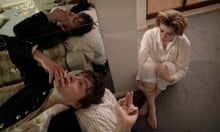It shouldn’t work, and maybe it shouldn’t even have got made. But it does and it has: and Joanna Hogg has given us an amazingly luminous self-portrait of the film-maker as a young woman: metatextual, confessional and autobiographical. And in two parts, what’s more, demanding our attention and getting it (the first part came out in 2019). The Souvenir is a movie that has defied the laws of film industry gravity, and those big names in the credits don’t in themselves explain this: a film that has floated free of what might be expected commercially or in any other way and carries itself with a marvellous austere artistry and compositional flair. And the sunbursts of emotion in the musical soundtrack gave me enough vitamin D to last the rest of the year.
In this second part, I found the things that were a challenge the first time around, such as its tendency to the opaque (although not unexpected for this director), have melted away, and the return of these characters is like the return of old friends and old lovers.
Honor Swinton Byrne is back as Julie, the insouciantly well-off young film student who we saw in the previous film having a tragic amour fou with a mysterious, complicated man called Anthony (Tom Burke) of destructive and predatory habits. Now Julie must creatively exorcise his devastating presence in her life and to that end, worries her film-school examiners by proposing to abandon the worthy docu-style study of working lives in Sunderland that she was supposed to be working on, going instead for a wild new personal fantasia, a non-narrative Bildungskino of the mind and heart. It sounds a bit Fellini-esque, and Hogg’s own film about it has a little of Almodóvar. But when we finally see the finished graduation film, there are moments of Powell and Pressburger, directors whom Anthony had affected to admire.
Tilda Swinton is back as Julie’s amiably grand and patrician mother Rosalind (allowing us once again to savour the fact that she is Swinton Byrne’s mother in real life); she allows Julie to live rent-free in the smart little pied-à-terre the family has in Knightsbridge and keeps on getting pestered for large amounts of money so Julie can make her graduation film.
Hilariously, Rosalind has been inspired by her daughter to take a creative class of her own, in pottery, and is terribly proud of a wonky little “Etruscan” pot she has made – and the awful fate of this artefact made me jump out of my seat and hide my eyes at the same time. And non-professional James Spencer Ashworth is back, wonderfully playing Julie’s lovable, sweet-natured dad William.
As Julie’s life and studies progress, Swinton Byrne shows us how Julie is growing up, going into therapy to deal with her anxiety and loneliness, accepting a sexual proposition from one of the actors, and also getting tougher, arguing for the camera positions she wants from the recalcitrant DP and having to let down actor mates who had assumed she was going to cast them in her film. Ariane Labed and Harris Dickinson play the people she actually chooses to do the Julie and Anthony roles, although dizzyingly – and perhaps inevitably – it is Swinton Byrne and Burke whose faces we see on screen. And Hogg appears to be using Julie’s movie-set version of the flat as the “real” thing. Richard Ayoade is again on glorious form playing the dyspeptic and ultra-opinionated fellow film student Patrick who makes a very cruel joke about his editor’s baldness. (Did Ayoade improvise that bit?)
For the first film, I found myself wondering, Ayoade’s presence aside, at the austere absence of comedy or irony that might with any other film-maker be an important part of telling Julie’s story. (I said it might have made the subject for an early novel by Muriel Spark or AN Wilson.) For this second film, the keynote is still certainly seriousness – intellectual seriousness and artistic seriousness. We are not invited to find anything precious or indulgent in Julie’s life, and in some way, of course, Anthony’s awful fate guards against that reaction. Yet perhaps it simply a function of a second film making the characters more familiar, but the bloodstream-temperature of the movie is heightened; for me, there was less detachment. I found myself more invested in everything that was happening. This second part makes its own kind of emotional sense and retrospective sense of the first film, too.
As ever with movies like this, some of what you might call the reading pleasure comes in wondering what has been taken from the director’s own life, what has been changed, what has been suppressed or misremembered. (I wondered this, a little, about her first film, Unrelated from 2007.) With a film about a film about a life, the puzzlement-slash-pleasure is redoubled. This rich and mysterious film is a real achievement.








Comments (…)
Sign in or create your Guardian account to join the discussion